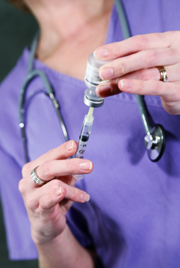 A diabetes vaccine would be an amazing dream. This dream may soon be a reality for some type 1 diabetes sufferers and for those who do not yet have the disease. A new drug under development has many people buzzing about the possibilities.
A diabetes vaccine would be an amazing dream. This dream may soon be a reality for some type 1 diabetes sufferers and for those who do not yet have the disease. A new drug under development has many people buzzing about the possibilities.
The studies have centered on children and adolescents with newly diagnosed (previous 3 months) type 1 diabetes. Approximately, 35,000 children are diagnosed each year with type 1 diabetes. For these juvenile diabetes sufferers, this new drug holds tremendous promise.
Diamyd(R) Type 1
Diamyd Medical, a Swedish biotech company, is currently testing a drug called Diamyd type 1. Diamyd has shown great promise in halting the degeneration of the insulin producing beta cells in the pancreas for children and adolescents with type 1 diabetes. This means that early research results show that the drug may be able to help newly diagnosed type 1 diabetes suffers produce insulin.
This conclusion was reached during an early “Phase II” study with 70 children between 10 and 18 years of age. Despite this early success, the final step before the drug is widely available is to undergo a much larger and more rigorous “Phase III” test. Phase III studies are currently being done in Europe and the United States, with final results expected in late 2010.
Use as a Diabetes Vaccine
While early studies have centered on the drugs ability to preserve a newly diagnosed diabetics insulin production, the latest buzz is the possibility of the drug to help prevent type 1 diabetes altogether. Now this would truly be a breakthrough!! The first study with the aim of “vaccinating” children with a high risk of diabetes was just started in June 2009. There currently is no cure or prevention possible for type 1 diabetes.
The European study will have a total of 50 children four years and older. Half of the children will receive a placebo, while the other half will receive the vaccine.
Other studies are also looking at the possibility of using Diamyd to reverse the effects of diabetes by regenerating lost beta cells and their insulin producing capacity. One such study is currently being sponsored by the National Institute of Health.
This is truly a drug worth keeping an eye on!
By Erich Schultz – Last Reviewed May 2012.
